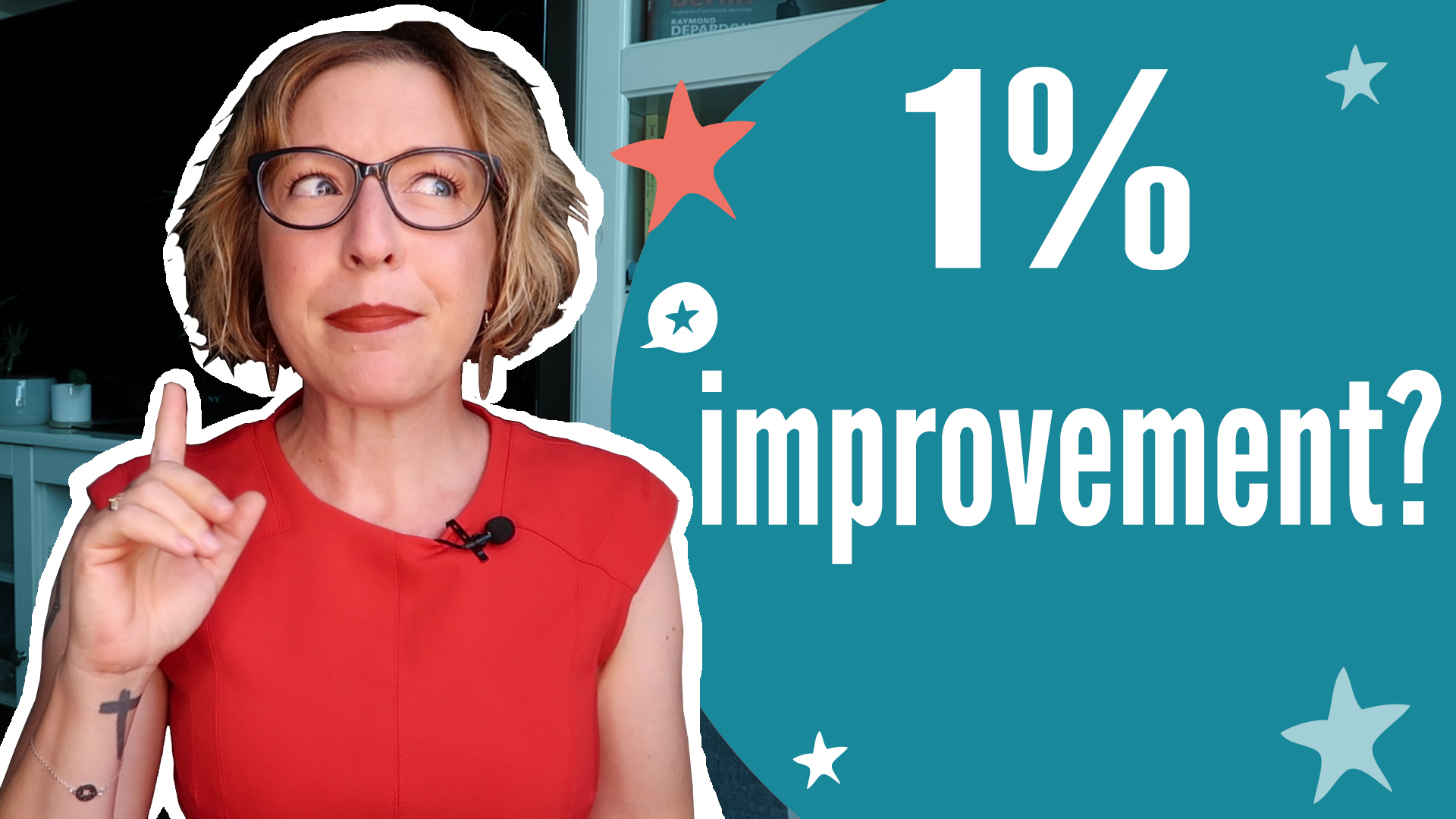
This is Video #3 of the series “Intermediate to advanced English, with virtual immersion & tiny habits”. In this video, we’ll see how tiny “1%” changes in your English can create big improvements in your fluency, confidence, and credibility.
If you missed Videos #1 & #2, here they are again:
- Stuck on the intermediate plateau in English?
- Create your Virtual Immersion routine in English [SAMPLE PLAN]
Last time, we talked about the concept of virtual immersion. You saw a concrete example of a virtual immersion plan for one day.
And you saw that, it’s possible to do English during your day, even if you’re busy. (Of course, it’s much easier if someone tells you exactly what you need to do! That’s why I gave you the plan 😉
When you make tiny changes over time, you improve much faster than you imagined!
In today’s video, I’ll show you how tiny changes in your English lead to great improvements in your confidence, fluency, and level.
This is the concept of marginal gains
What are “marginal gains”?
4 concrete “1% improvements” you can make today
1% grammar improvement: Uncountable nouns that are common in business English
1% vocabulary improvement: Phrasal verb “look into” instead of “investigate” or “research”
1% pronunciation improvement: “Wednesday”
1% business English improvement: Writing & saying dates
4 tiny changes = 4 big improvements
1. What are “marginal gains”?
“Marginal gains” = making very small improvements over a period of time. Over time, a lot of small improvements creates a lot of improvement in your general performance.
It’s a very step-by-step approach. British cycling coach Dave Brailsford made this approach popular.
The British cycling team hired Brailsford in 2003 to coach their team, because they had had very bad performance for the past 100 years.
Since 1908, British cyclists had only won 1 Olympic gold medal. Their performance was so bad that a big European bicycle manufacturer refused to sell their bikes to the British team. The company was afraid it would hurt their reputation, if other cyclists saw a bad team using their bikes!
To fix the situation, Brailsford implemented a new coaching system. He called this the system of “marginal gains.”
He looked at every aspect of cycling performance. And he found a way to improve each aspect individually.
These were very small changes:
- What’s the best position for the bike seat?
- What’s the best clothes to wear when cycling?
- What’s the best breakfast to eat before a race?
- And other small changes
Individually, each change was very small.
But when the team combined all of the small changes, over time, they made great improvements.
After the changes, the British Cycling team won 60% of cycling gold medals in the 2008 Beijing Olympics.
They set 7 world records in the 2012 London Olympics, and won the Tour de France in 2012, 2013, 2015, 2016, and 2017.
And remember, before using the concept of marginal gains, the team had won zero events since 1908!
So marginal gains are small changes that combine to great great improvements.
It’s what happens in a Virtual Immersion program, like Business English Mastery.
2. 4 concrete “1% improvements” you can make today
As you learn each of these 1% improvements, imagine the difference they will make in your English.
Imagine how you’ll sound more natural, more correct.
Imagine how you’ll feel more confident.
Imagine if you could make small 1% changes like this EVERY day for the next 3 months!
Right now, these may seem like very small improvements. It may seem that they don’t make a difference.
But when you make small improvements over a period of time, you will see A LOT of improvement in your English level, and your confidence.
3. 1% grammar improvement: Uncountable nouns that are common in business English
Let’s look at 3 words that are very common in business:
- Information
- Data
- Advice
These words NEVER have -s at the end of them!
She gave me the (informationS) information I needed.
She gave me the (dataS) data I needed.
She gave me the (advices) advice I needed.
→THE CHANGE: This grammar rule is clear now! You never need to ask yourself the question about “Should I put -s at the end?” But you need to practice so it becomes a reflex to use the correct form.
4. 1% vocabulary improvement:
Phrasal verb “look into” instead of “investigate” or “research”
In conversation, we often use the phrasal verb “to look into” instead of its synonyms “investigate” or “research”
Examples:
“I’ll investigate LOOK INTO the source of the problem and prepare a report.”
“I’ll research LOOK INTO some possible dates for the conference.”
It’s also correct to say “investigate” and “research”, but it’s more informal to use “look into.”
→ THE CHANGE: Now, you can use the phrasal verb “look into” to sound more natural in your conversations, by using “look into” instead of “investigate” and “research”!
5. 1% pronunciation improvement: “Wednesday”
You know that the way you write a word in English, and the way you pronounce a word in English are sometimes very different.
When you need to schedule meetings & events, it’s good to pronounce this day of the week correctly: Wednesday.
We pronounce it /wins-day/, not /wed-nes-day/. (Watch the video to hear the example, and practice with me!)
→ THE CHANGE: Now, you have zero doubts about how to pronounce Wednesday, and can say it with 100% confidence. (Again, practice will help you have the good habit to pronounce it correctly!)
6. 1% business English improvement: Writing & saying dates
Here’s a quick & easy tip to avoid confusion with dates:
Write the date like this:
Date (number) – month – year
For example: Today is 1 September 2020.
It works in all countries because it is impossible to confuse the day and the month.
In contrast, if you try to write dates like Americans and British typically write dates, it can create confusion.
For example: 9/1/2020
Is it 9 January 2020, or September 1, 2020?
It depends on the country where you live!
That can be confusing for international communication (and lead to BIG mistakes in planning!).
That’s how you can write dates, but how can you say dates?
Say the date like this:
Month – ordinal number (1st, 2nd, 3rd, 4th – 11th, 12th, etc.) – year.
So today is “September first, two thousand twenty”
Tomorrow is September second two thousand twenty, etc.
7. 4 tiny changes = 4 big improvements
Those are 4 tiny changes to your English, but now that you know them, and you’re 100% sure about them.
And you can use them confidently starting today, because they’re so common in business conversations.
Already, you’re making changes in the way you speak English!
Now, imagine if you made tiny improvements like this every day, because you have an English routine, and good learning habits.
You make improvements in grammar and vocabulary, but also in your communication skills, the way you present in English, your confidence, your mindset…
Over time, you will learn faster than you ever imagined. You’re doing it step by step, each day, in a virtual immersion with my team and me.
And now, you’re one step, even a few steps, closer to speaking better English and feeling more confident!
If you want to join my Virtual Immersion System, Business English Mastery, subscribe to my email list today!
Enrollments open tomorrow, Wednesday September 2nd.
People on my email list get an invitation tomorrow to start the program with my team and me.
Plus, if you are one of the first people to join, you get some exceptional bonus gifts.
This program gives you everything you need to transform your English and your self-confidence. You work with my team and me directly, for the next 3 months.
I’ll see you tomorrow!
More good stuff...
Click the image to learn more







